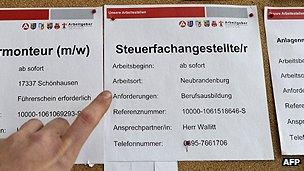Southern European workers fuel German immigration surge
- Published

Germany has seen its biggest rise in immigration in nearly 20 years, with a surge of jobseekers from southern and eastern Europe.
Just over one million people moved to Germany in 2012 - the highest level since 1995, official records show.
Germany's economy has proven robust in the storm of the eurozone crisis, whereas Greece, Spain and some other EU countries have record unemployment.
Most migrants to Germany still come from Poland and Romania.
Immigration to Germany was up 13% over the previous year - a sign of the gulf between its unemployment rate of around 7% and that in crisis-stricken Greece and Spain, where a quarter of the workforce are jobless.
"The rise in immigration from EU countries hit by the financial and debt crisis is particularly strong", the German statistics office said.
The rise in immigration from Spain, Greece, Portugal and Italy was a jump of 40-45% compared with the 2011 figures.
Poland topped the list of countries of origin in 2012, with 68,122 Poles moving to Germany, followed by Romania (45,684), Hungary (26,165), Bulgaria (25,044) and Greece (21,970).
Immigration from non-EU European states rose by 14%, from Africa by 14% too, and from Asia by 10%.
The figure for emigration of people from Germany last year was 712,000.
In 2011, Germany also experienced a big rise over the year before in immigration from Mediterranean countries.
Free movement of workers is a core principle enshrined in EU treaties, but has come under increasing pressure amid fears of large-scale migration provoked by recession. Temporary restrictions are allowed if countries can give evidence of local labour market difficulties.
- Published7 December 2012
- Published14 December 2011
- Published19 March 2012